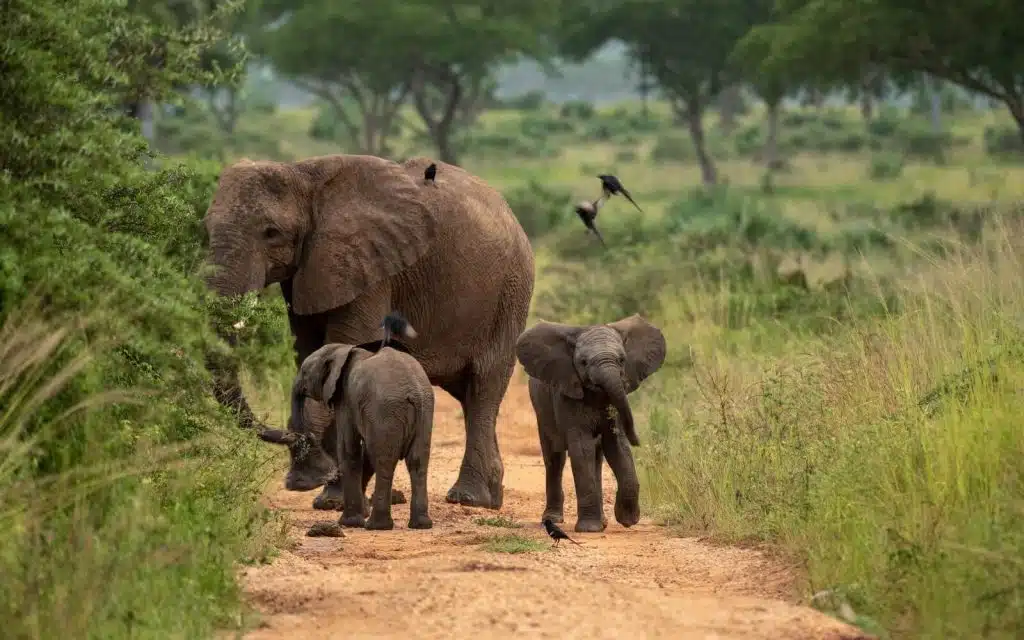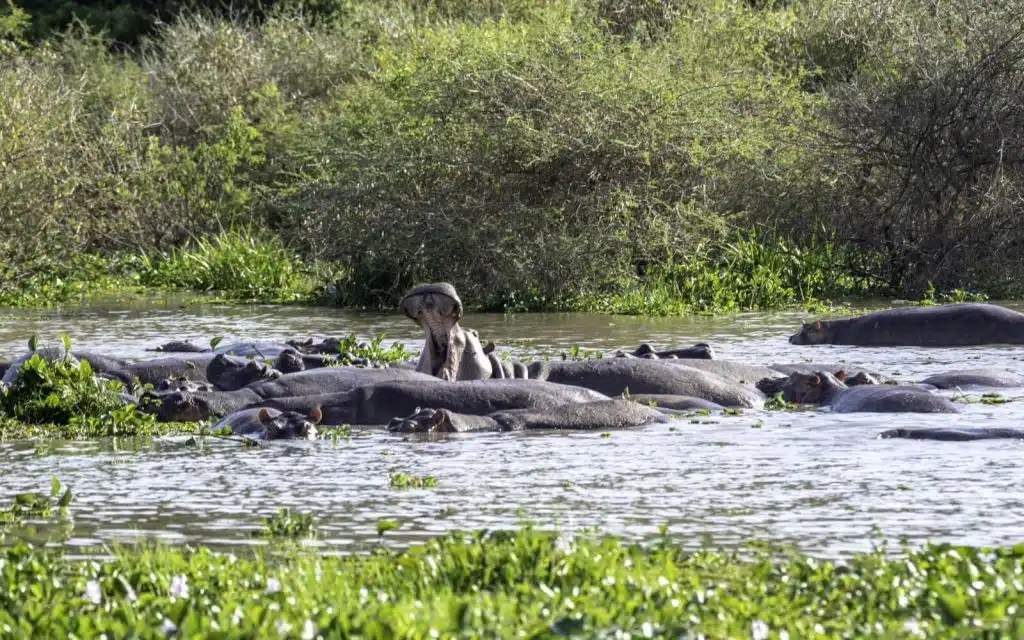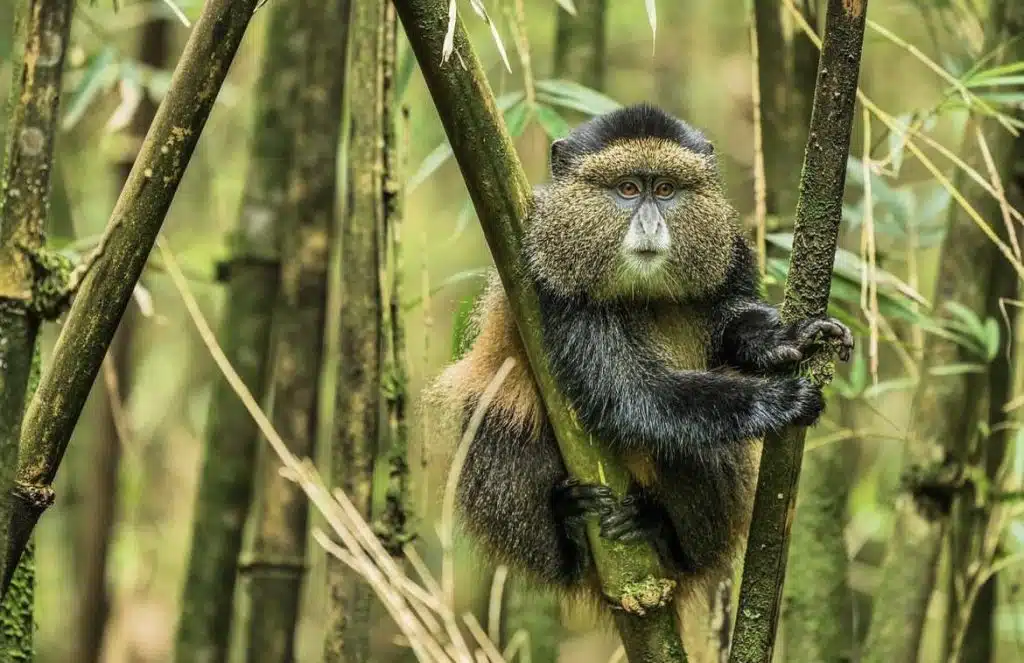Imagine encountering mountain gorillas in misty forests and spotting lions on vast golden savannahs teeming with wildlife. The perfect timing for your East African adventure can make all the difference. Whether you’re trekking through dense jungles or exploring open plains, Uganda’s dry seasons are the prime time for a safari.
Dry Season: Uganda’s Wildlife in Full Splendor (June-August, December-February)

Uganda’s dry season, spanning from June to August and December to February, offers ideal safari conditions. During these months, animals congregate around scarce water sources, making them easier to spot. The absence of heavy rains ensures smooth game drives on easily navigable roads, while the pleasant weather enhances your overall experience.
Why is the dry season so exceptional?
- Abundant Wildlife: Witness lions basking in the sun and herds of elephants traversing the savannah.
- Prime Game Viewing: Explore renowned national parks like Murchison Falls and Queen Elizabeth, where wildlife viewing is at its peak.
- Gorilla Trekking: Embark on the adventure of a lifetime, trekking through misty mountains to encounter rare mountain gorillas. The dry season ensures less slippery trails, facilitating your journey in Bwindi Impenetrable National Park and Mgahinga Gorilla National Park.
Insider Tip: The dry season provides the best chance for a comfortable trek, but don’t let that deter you from visiting in other months if you crave a more challenging adventure.
Wet Season: A Birdwatcher’s Paradise (March-May, September-November)

While the wet season (March to May and September to November) might not seem ideal for safaris, it holds a hidden gem for bird enthusiasts. Uganda, home to over 1,000 bird species, unveils its most colorful and unique avian residents, including migratory species during the rains. The lush landscapes come alive, offering a paradise for birdwatchers.
Why you might think twice about the wet season unique?
- Spectacular Birding: Witness vibrant birdlife against a backdrop of lush green scenery.
- Fewer Crowds and Discounts: Enjoy a more intimate safari experience with fewer tourists and potential discounts at lodges.
Note: While rain can make roads challenging, the rewards are worth it. Many safari lodges are equipped to handle the wet weather, ensuring your comfort.
Extraordinary Experiences by Month: The Best of Both Worlds
- July and August: Peak season for wildlife viewing, with dry conditions concentrating animals around water sources.
- January and February: Enjoy a dry safari with relative solitude.
- November and April: Experience thrilling boat safaris in places like Murchison Falls, where water levels are high.
Cultural Festivals & Events: Immerse Yourself in Uganda’s Rich Culture
Beyond wildlife, Uganda boasts a vibrant culture. Depending on your visit timing, you might experience local festivals that offer a deeper connection to the country. Consider planning your tour around these events to combine wildlife encounters with cultural immersion.
Safari Accommodations: The Season Matters
Accommodation prices vary throughout the year. Lodges and camps, which charge higher rates, are often fully booked during the dry season. Conversely, the wet season offers discounted prices and a more private experience.
Imagine Staying in a cozy lodge with personalized attention from the staff. This is perfect for honeymooners or those seeking an intimate safari.
Photography: Capturing the Perfect Shot

The season impacts the type of photos you’ll capture. Dry days offer clear skies, excellent lighting, and unobstructed views, ideal for sharp wildlife shots. The wet season, however, presents lush landscapes, dramatic skies, and opportunities to photograph animals in a vibrant setting.
Pack Smart: Gear Up for Your Adventure
- Dry Season: Pack light, breathable clothing, sunscreen, a hat, sunglasses, and a camera with a zoom lens.
- Wet Season: Bring waterproof boots, a rain jacket, insect repellent, and binoculars for birding.
Uganda’s natural beauty shines year-round. Whether you visit during the dry or wet season, you’re in for an extraordinary adventure. June to August and December to February are optimal for wildlife enthusiasts and adventurers. Bird lovers or those seeking a quieter, budget-friendly, intimate experience should consider the wet months.
No matter when you choose to visit, Uganda will captivate you with its majestic landscapes, incredible wildlife, and warm culture. Pack your bags and prepare for the safari of a lifetime!






